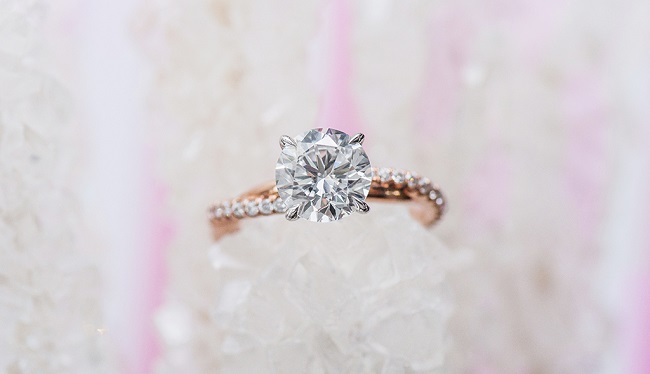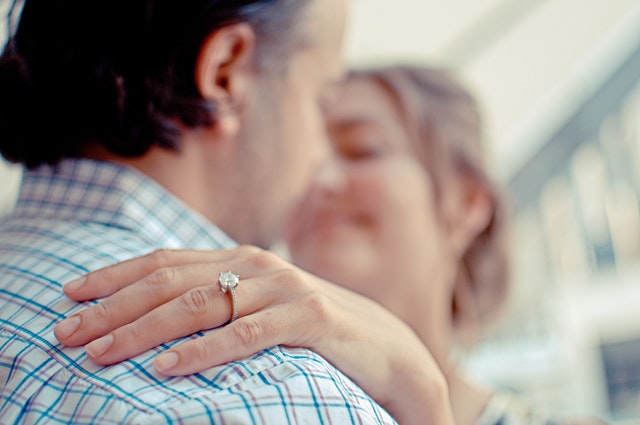Are Super Ideal Cut Diamonds Worth it?
April 20, 2020
Pavé Diamond Engagement Ring Settings: A Complete Guide
May 20, 2020Fake Diamonds: What to Avoid When Shopping for a Diamond Online

In my years of experience helping customers successfully buy diamonds online, one of the questions I am most commonly asked is ‘how will I know if it’s a fake?’. The fear of purchasing a fake diamond is nothing new, but the rise of online shopping has brought with it new waves of concern for first time buyers.
Buying a diamond online ensures the best prices, best selection and some of the most beautiful diamonds. This guide will give you the confidence to shop online, avoid fakes and get the best, genuine diamond within your budget.
Types of Fake Diamond
‘Fake diamond’ is a fairly vague term, but it can be attached to anything being falsely sold as a natural/real diamond. The biggest cause for concern for modern buyers is synthetic or lab-grown diamonds, which are visually nearly identical to a real diamond, however there has been several warnings on color instability within synthetic diamonds.
The table below shows common diamond fakes, their appearance and properties, price brackets and Mohs score. The Mohs scale measures the hardness of one material scratched against another and give it a score out of 10 (a natural/real diamond has a Mohs score of 10).
| Material | Cubic Zirconia | Moissanite | Sapphire | Lab Grown/Synthetic Diamonds |
|---|---|---|---|---|
| Mohs Scale | 8.5 | 9.25 | 9 | 10 |
| Properties & Appearance | Fairly durable, synthetic material. CZ’s develop a milky, murky appearance over time and scratch much easier than a natural/real diamond. | Moissanite used in jewelry is synthetic. Moissanite is a durable material with a much higher refractive index than a natural diamond – this can create a colourful, ‘disco ball’ effect, distinguishing it from the balance of brilliance, fire and scintillation observed in a real diamond. | Colored sapphires make a beautiful addition to jewelry, but white sapphires have a blurry appearance and do not sparkle like a diamond. | Synthetic diamonds have extremely close physical and chemical properties to a diamond. Their appearance is nearly identical Synthetics do not have the same reliable grading systems in place. Their color has also been known to deteriorate over time. |
| Average price for 1.00ct | $10 | $280 | $600 | Anywhere from $1,000 to $4,500 |
If you know you are buying an imitation as a piece of sparkling costume jewelry, there is no problem with this. The price reflects the durability, beauty, scarcity, and graded quality characteristics VS a natural/real diamond.
Tips for Avoiding Fake Diamonds Online
The fear for consumers is purchasing one of these materials under the guise that it is a genuine, natural/real diamond. This is where I can offer some reassurance.
Buy AGS and GIA certified diamonds
As the leading institutes in diamond grading, a GIA or AGS certification is essential for customers to know exactly what they are buying and that it is genuine. These labs perform rigorous testing on all diamonds submitted for certification and have access to the most advanced technology available.
Buy from Reputable Online Vendors
The chances of a reputable vendor selling you a fake diamond is extremely slim. As well as certification, diamonds are sold under the Kimberley Process – this creates a reliable paper trail for your diamond and helps prove it is ethical and authentic.
If you’re looking for a reputable dealer I would recommend considering Whiteflash, Hearts on Fire and Blue Nile that only sell real diamonds and do not indulge in synthetic/lab grown diamonds.
Trust your instincts
This advice may seem contradictory, given my recommendations to seek professional advice, but if you are already having doubts that a diamond is natural, make sure you listen to them. Super low prices, a lack of in stock photographs, no certificate…any one of these red flags should be enough to make you stop and conduct further research.
Use online resources
Through my work with Your Diamond Guru I have reviewed hundred of online vendors and, using my experience, have delivered reviews of my findings. I would also suggest looking at all vendors’ Google, Yelp and iVouch reviews as well.
Pay attention to wording
There are lots of companies now selling lab-grown/synthetic diamonds and not all of them are explicit in their descriptions. Smooth marketing campaigns can skim over the origins of a diamond leaving buyers in the dark. If in doubt, contact the company and ask for a clear answer as to the creation of the diamonds.
Testing if a diamond is fake
There are several tests to determine whether a diamond is real or fake, however none of them are 100% accurate and none of them will detect a lab-grown/synthetic diamond from a natural/real diamond. Avoid the need for home tests by buying GIA and AGS certified diamonds from reputable vendors that specify that they are not lab grown. The GIA/AGS are the leading research labs for diamonds and are have advanced systems in place to detect synthetic diamonds.
If I can’t see the diamond in person, how will I know if it is a fake?
One of the preconceptions is that buying online increases the risk of buying a fake diamond because you can’t ‘see’ the diamond. This is false for a few reasons. The first is that for a novice buyer, ‘by eye’ detection is not reliable, particularly if there isn’t a natural/real diamond to make a direct comparison with. Furthermore, if the fake is a lab grown/synthetic diamond, even an expert would not be able to tell the difference by eye, even with a jewelers loupe.


